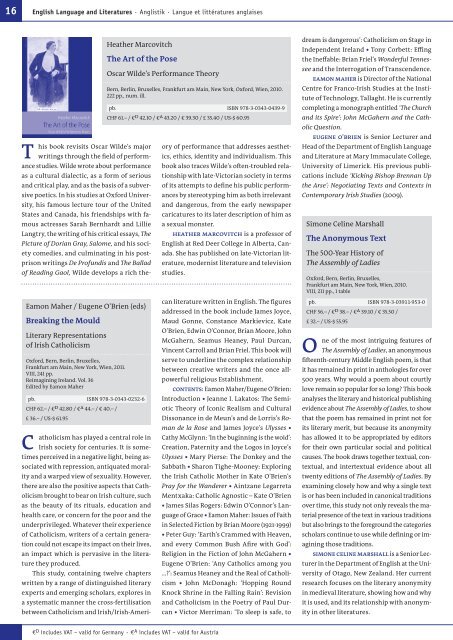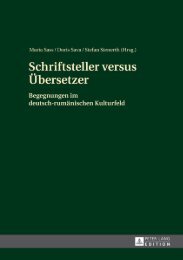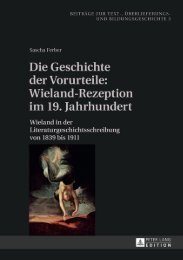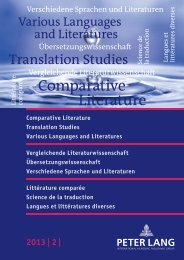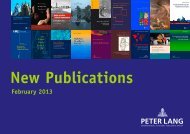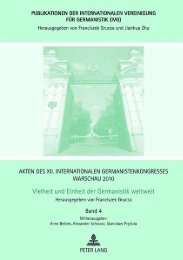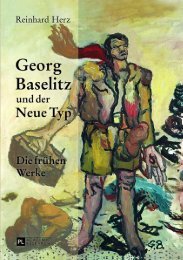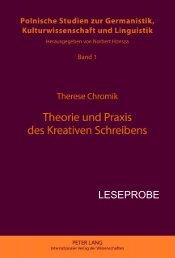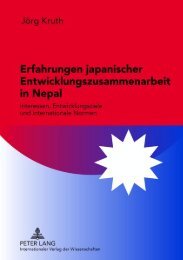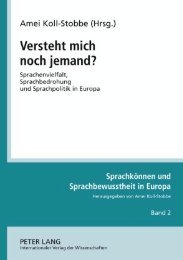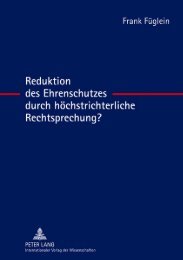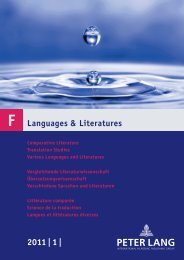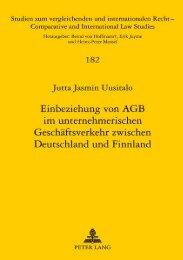Languages & Literatures 2011 | 1 | - Peter Lang
Languages & Literatures 2011 | 1 | - Peter Lang
Languages & Literatures 2011 | 1 | - Peter Lang
You also want an ePaper? Increase the reach of your titles
YUMPU automatically turns print PDFs into web optimized ePapers that Google loves.
16 English <strong>Lang</strong>uage and <strong>Literatures</strong> · Anglistik · <strong>Lang</strong>ue et littératures anglaises<br />
T<br />
Eamon Maher / Eugene O’Brien (eds)<br />
Breaking the Mould<br />
Literary Representations<br />
of Irish Catholicism<br />
Oxford, Bern, Berlin, Bruxelles,<br />
Frankfurt am Main, New York, Wien, <strong>2011</strong> .<br />
VIII, 241 pp .<br />
Reimagining Ireland . Vol . 36<br />
Edited by Eamon Maher<br />
pb . ISBN 978-3-0343-0232-6<br />
CHF 62 .– / € D 42 .80 / € A 44 .– / € 40 .– /<br />
£ 36 .– / US-$ 61 .95<br />
C<br />
Heather Marcovitch<br />
The Art of the Pose<br />
his book revisits Oscar Wilde’s major<br />
writings through the field of performance<br />
studies . Wilde wrote about performance<br />
as a cultural dialectic, as a form of serious<br />
and critical play, and as the basis of a subversive<br />
poetics . In his studies at Oxford University,<br />
his famous lecture tour of the United<br />
States and Canada, his friendships with famous<br />
actresses Sarah Bernhardt and Lillie<br />
<strong>Lang</strong>try, the writing of his critical essays, The<br />
Picture of Dorian Gray, Salome, and his society<br />
comedies, and culminating in his postprison<br />
writings De Profundis and The Ballad<br />
of Reading Gaol, Wilde develops a rich the-<br />
atholicism has played a central role in<br />
Irish society for centuries . It is sometimes<br />
perceived in a negative light, being associated<br />
with repression, antiquated morality<br />
and a warped view of sexuality . However,<br />
there are also the positive aspects that Catholicism<br />
brought to bear on Irish culture, such<br />
as the beauty of its rituals, education and<br />
health care, or concern for the poor and the<br />
underprivileged . Whatever their experience<br />
of Catholicism, writers of a certain generation<br />
could not escape its impact on their lives,<br />
an impact which is pervasive in the literature<br />
they produced .<br />
This study, containing twelve chapters<br />
written by a range of distinguished literary<br />
experts and emerging scholars, explores in<br />
a systematic manner the cross-fertilisation<br />
between Catholicism and Irish/Irish-Ameri-<br />
Oscar Wilde’s Performance Theory<br />
Bern, Berlin, Bruxelles, Frankfurt am Main, New York, Oxford, Wien, 2010 .<br />
222 pp ., num . ill .<br />
pb . ISBN 978-3-0343-0439-9<br />
CHF 61 .– / € D 42 .10 / € A 43 .20 / € 39 .30 / £ 35 .40 / US-$ 60 .95<br />
€ D includes VAT – valid for Germany · € A includes VAT – valid for Austria<br />
ory of performance that addresses aesthetics,<br />
ethics, identity and individualism . This<br />
book also traces Wilde’s often-troubled relationship<br />
with late-Victorian society in terms<br />
of its attempts to define his public performances<br />
by stereotyping him as both irrelevant<br />
and dangerous, from the early newspaper<br />
caricatures to its later description of him as<br />
a sexual monster .<br />
heatheR MaRCovitCh is a professor of<br />
English at Red Deer College in Alberta, Canada<br />
. She has published on late-Victorian literature,<br />
modernist literature and television<br />
studies .<br />
can literature written in English . The figures<br />
addressed in the book include James Joyce,<br />
Maud Gonne, Constance Markievicz, Kate<br />
O’Brien, Edwin O’Connor, Brian Moore, John<br />
McGahern, Seamus Heaney, Paul Durcan,<br />
Vincent Carroll and Brian Friel . This book will<br />
serve to underline the complex relationship<br />
between creative writers and the once allpowerful<br />
religious Establishment .<br />
ContentS: Eamon Maher/Eugene O’Brien:<br />
Introduction • Jeanne I . Lakatos: The Semiotic<br />
Theory of Iconic Realism and Cultural<br />
Dissonance in de Meun’s and de Lorris’s Roman<br />
de la Rose and James Joyce’s Ulysses •<br />
Cathy McGlynn: ‘In the buginning is the woid’:<br />
Creation, Paternity and the Logos in Joyce’s<br />
Ulysses • Mary Pierse: The Donkey and the<br />
Sabbath • Sharon Tighe-Mooney: Exploring<br />
the Irish Catholic Mother in Kate O’Brien’s<br />
Pray for the Wanderer • Aintzane Legarreta<br />
Mentxaka: Catholic Agnostic – Kate O’Brien<br />
• James Silas Rogers: Edwin O’Connor’s <strong>Lang</strong>uage<br />
of Grace • Eamon Maher: Issues of Faith<br />
in Selected Fiction by Brian Moore (1921-1999)<br />
• <strong>Peter</strong> Guy: ‘Earth’s Crammed with Heaven,<br />
and every Common Bush Afire with God’:<br />
Religion in the Fiction of John McGahern •<br />
Eugene O’Brien: ‘Any Catholics among you<br />
…?’: Seamus Heaney and the Real of Catholicism<br />
• John McDonagh: ‘Hopping Round<br />
Knock Shrine in the Falling Rain’: Revision<br />
and Catholicism in the Poetry of Paul Durcan<br />
• Victor Merriman: ‘To sleep is safe, to<br />
dream is dangerous’: Catholicism on Stage in<br />
Independent Ireland • Tony Corbett: Effing<br />
the Ineffable: Brian Friel’s Wonderful Tennes-<br />
see and the Interrogation of Transcendence .<br />
Simone Celine Marshall<br />
The Anonymous Text<br />
The 500-Year History of<br />
The Assembly of Ladies<br />
Oxford, Bern, Berlin, Bruxelles,<br />
Frankfurt am Main, New York, Wien, 2010 .<br />
VIII, 211 pp ., 1 table<br />
pb . ISBN 978-3-03911-953-0<br />
CHF 56 .– / € D 38 .– / € A 39 .10 / € 35 .50 /<br />
£ 32 .– / US-$ 55 .95<br />
O<br />
eaMon MaheR is Director of the National<br />
Centre for Franco-Irish Studies at the Insti-<br />
tute of Technology, Tallaght . He is currently<br />
completing a monograph entitled ‘The Church<br />
and its Spire’: John McGahern and the Cath-<br />
olic Question .<br />
eugene o’BRien is Senior Lecturer and<br />
Head of the Department of English <strong>Lang</strong>uage<br />
and Literature at Mary Immaculate College,<br />
University of Limerick . His previous publications<br />
include ‘Kicking Bishop Brennan Up<br />
the Arse’: Negotiating Texts and Contexts in<br />
Contemporary Irish Studies (2009) .<br />
ne of the most intriguing features of<br />
The Assembly of Ladies, an anonymous<br />
fifteenth-century Middle English poem, is that<br />
it has remained in print in anthologies for over<br />
500 years . Why would a poem about courtly<br />
love remain so popular for so long? This book<br />
analyses the literary and historical publishing<br />
evidence about The Assembly of Ladies, to show<br />
that the poem has remained in print not for<br />
its literary merit, but because its anonymity<br />
has allowed it to be appropriated by editors<br />
for their own particular social and political<br />
causes . The book draws together textual, contextual,<br />
and intertextual evidence about all<br />
twenty editions of The Assembly of Ladies . By<br />
examining closely how and why a single text<br />
is or has been included in canonical traditions<br />
over time, this study not only reveals the material<br />
presence of the text in various traditions<br />
but also brings to the foreground the cat egories<br />
scholars continue to use while defining or im-<br />
agining those traditions .<br />
SiMone Celine MaRShall is a Senior Lec-<br />
turer in the Department of English at the Uni-<br />
versity of Otago, New Zealand . Her current<br />
research focuses on the literary anonymity<br />
in medieval literature, showing how and why<br />
it is used, and its relationship with anonym-<br />
ity in other literatures .


